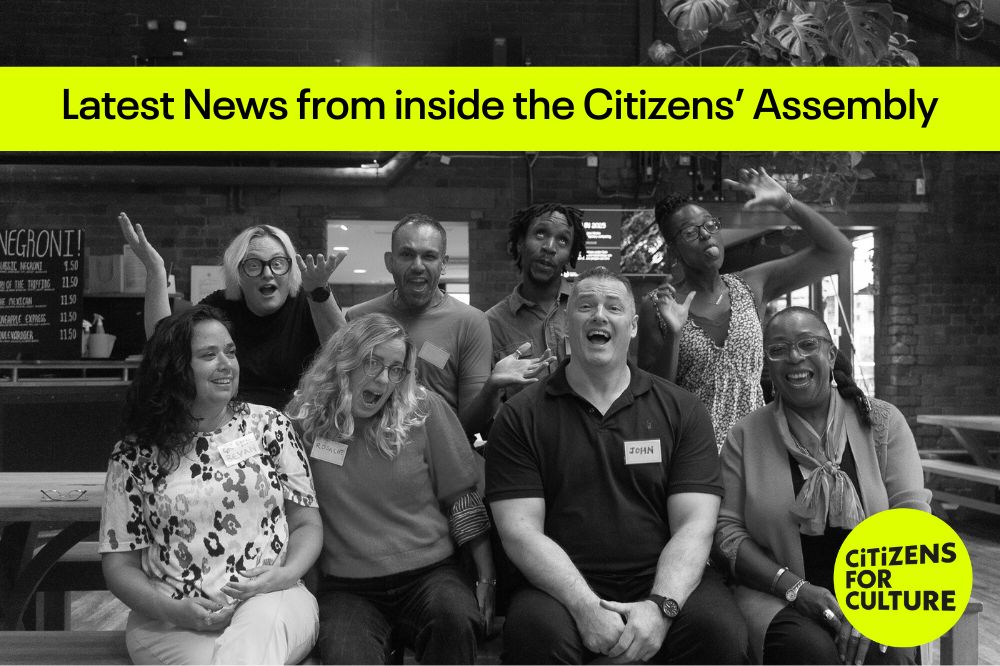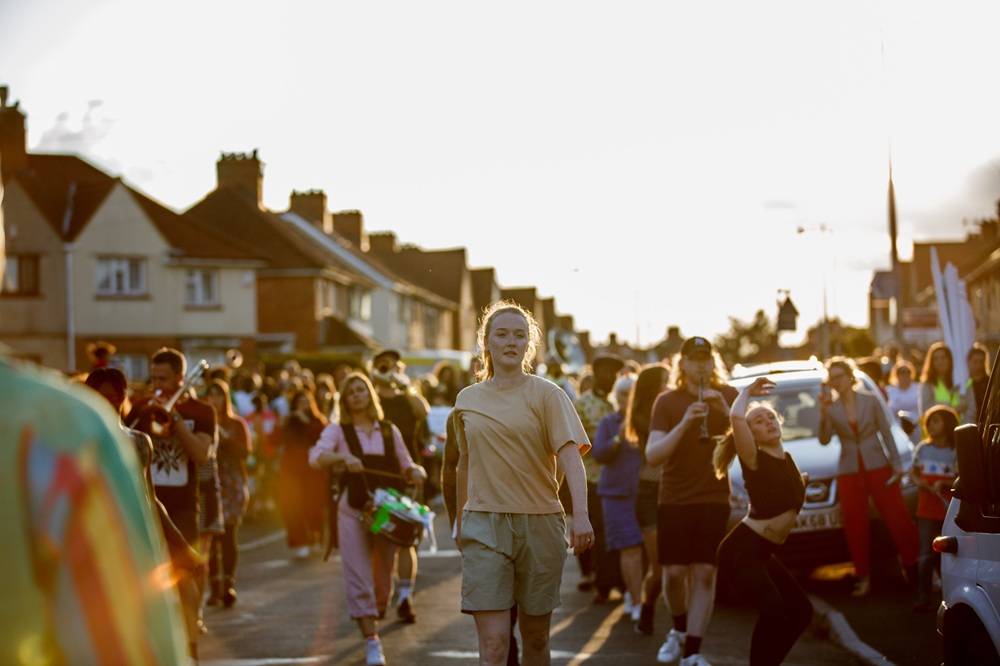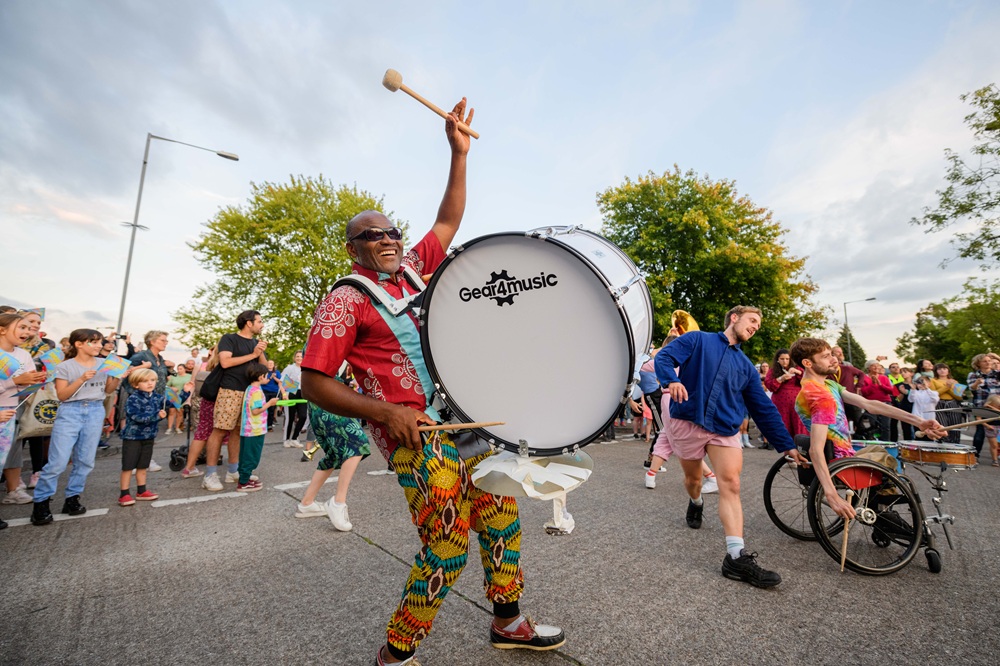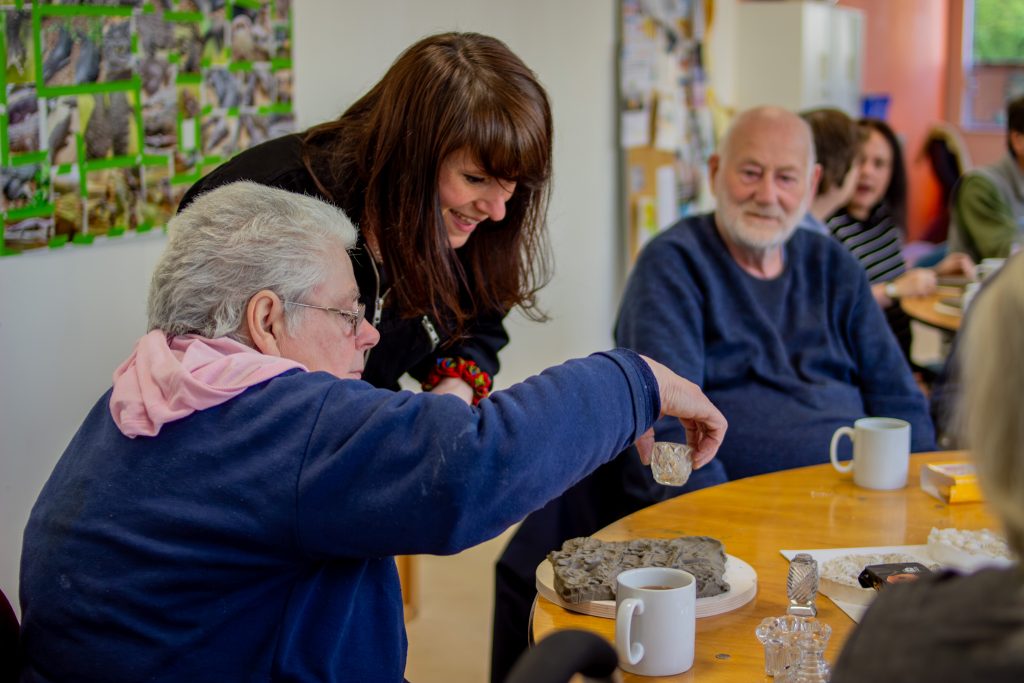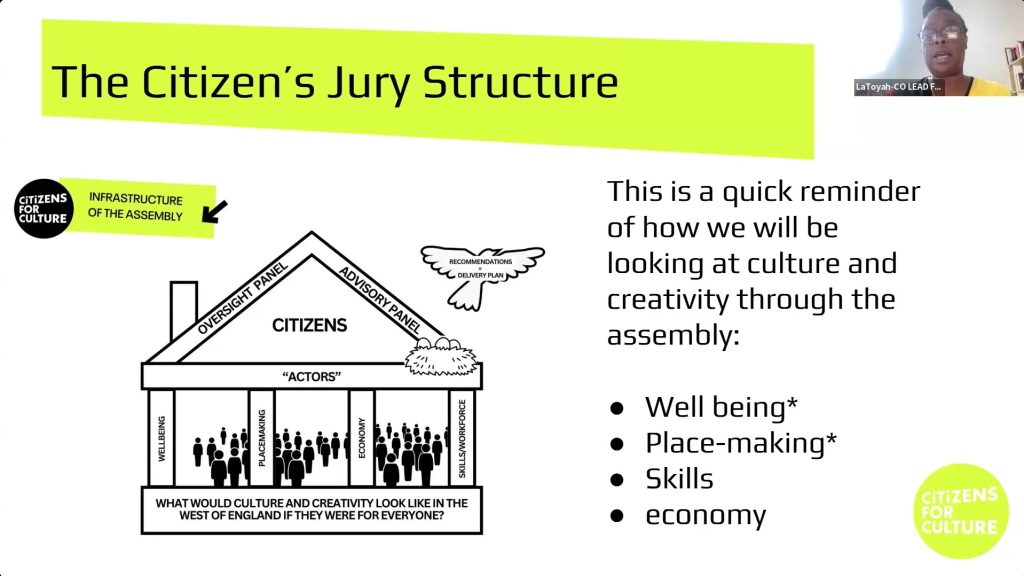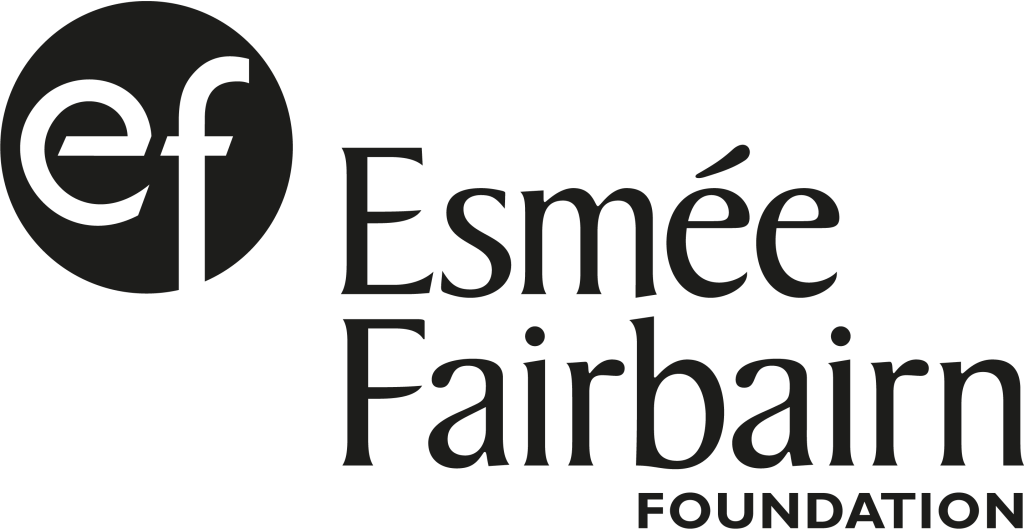10th November update
On Sunday 9 November, the West of England Citizens’ Assembly met in person for its final session.
Over the past two months, 52 citizens from across Bath and North East Somerset, Bristol, North Somerset and South Gloucestershire have been meeting to answer the question:
What would culture and creativity look like in the West of England if they were for everyone?
This final meeting brought together all the ideas, discussions and evidence from previous sessions. Citizens arrived on Sunday having voted for their area and region-wide priorities developed in October and set about turning these into practical actions for a new region-wide Cultural Delivery Plan.
The day opened with a welcome and a chance for members of the Assembly to explore a gallery of materials from previous sessions, including citizens’ own notes, extracts from presentations as well as “snapshot” evidence.
The morning focused on an exploration of power. There were discussions about how change happens and who holds the power to make it happen. Citizens returned to the idea of different “Actors” or stakeholders who have different roles and relationships in the creative and cultural sector, including councils, funders, cultural organisations, communities, and creative practitioners. There were a wide range of discussions about who has power, where influence sits and how it might be shared more fairly.
The Assembly observed a two-minute silence at 11am as part of Remembrance Day.
Assembly members then reviewed insights gathered in earlier sessions before working in small groups to draft short, medium and long-term actions under their selected priorities. These covered themes such as Wellbeing, Placemaking, Skills, and Economy, building on the previous eight days of discussion about how culture can support fairer opportunities and grow stronger communities.
In the afternoon, citizens refined their ideas through a process of review and feedback, ensuring that every action was realistic and responded to the Assembly question. The day closed with all groups sharing their final action plans, followed by warm applause and thanks for the collective effort that had brought the Assembly to an exciting conclusion.
One of the next steps will be for a Citizen Oversight Panel to be established from the Citizens’ Assembly to oversee the implementation of the Assembly’s action plan and ensure the principles of citizen-led decision-making continue beyond the Assembly.
Over the coming weeks, the Assembly organisers will be in touch with all the individuals and organisations who have signed up to support the Citizens’ Assembly and its next steps with the outcomes of the Assembly to be shared at an event on Thursday 11 December, in which citizens from the Assembly will share their ideas with the Mayor and the wider cultural sector.
If you are someone who works in or around the cultural sector, there is still time to get involved and support the Citizens’ Assembly and the Cultural Delivery Plan created by citizens — to find out more or register your interest, please email david@citizensinpower.com
26th October update:
On Sunday, the West of England Citizens’ Assembly met online to begin drafting local priorities for culture and creativity across four Unitary Authority areas – Bath and North East Somerset, Bristol, North Somerset and South Gloucestershire.
The day began with a welcome and a reflection on how far the group has come in its journey. On Sunday morning, the Assembly worked together to define the problem that is implied by the Assembly question: What would culture and creativity look like in the West of England if they were for everyone? What barriers currently prevent culture and creativity from being “for everyone”?
To help explore this, the Assembly watched an interview between LaToyah McAllister-Jones and Professor Ele Belfiore who is an academic specialising in cultural policy and democracy.
Professor Belfiore discussed the inequalities built into the UK’s cultural infrastructure. She argued that while everyone makes and experiences culture, publicly funded culture continues to privilege those who are wealthier, better educated and more likely to work within established systems. She highlighted how funding frameworks and decision-making processes reinforce these inequalities, often giving disproportionate authority to a small group of decision-makers.
Professor Belfiore asked the Assembly to think not only about access, but about agency — shifting from a model where institutions “grant” access to one where citizens have genuine power to shape cultural life and funding priorities. She also challenged the language of “hard to reach” communities, arguing that exclusion is systemic rather than personal, and that fairness requires transforming how decisions are made, not just increasing budgets.
In her words:
“Nobody owns culture and nobody controls access to it. There are differences in people’s ability to take advantage of the opportunity to be creative — and that’s the bit we need to focus on. How do you give the widest number of people the richest range of opportunities to create their own culture, rather than keep begging the gatekeepers to let some more people in?”
Following the interview, citizens met in small groups to reflect on the discussion, identifying key ideas and implications for their own areas across the region.
In the afternoon, the Assembly turned its attention to drafting place-based priorities – key issues for the four Unitary Authority areas. Working in groups, citizens generated ideas across four themes — Placemaking, Wellbeing, Skills, and Economy. Ideas were clustered, discussed and refined through facilitated exercises before each group voted on which priorities to develop further.
By the end of the day, each local group had produced a set of priorities for the future of culture and creativity in their area. The next step in the final Assembly meeting on Sunday 9th November is to create a practical Cultural Delivery Plan for the region.
19th October update:
This weekend the West of England Citizens’ Assembly met in Bristol for a day focused on connecting what they have learned from previous sessions and beginning to shape early ideas for recommendations.
52 citizens came together from across Bath and North East Somerset, Bristol, North Somerset and South Gloucestershire to continue answering the question:
What would culture and creativity look like in the West of England if they were for everyone?
After two online weekends of place-based sessions exploring themes such as wellbeing, placemaking, skills and economy, this in-person day brought all the citizens together again under one roof. The focus was on linking evidence gathered so far, deepening understanding, and starting to identify priorities for the place-based priorities and the regional Cultural Plans.
The morning began with a welcome from the lead facilitators and time for citizens to reconnect, using conversation cards and small group reflections to share how they were arriving at the day.
The first session was a discussion on Culture and Activism, with James Sardi (Led by Donkeys) and Julz Davis (Curiosity Unlimited), exploring how cultural and creative practice can inspire change and civic participation. The conversation used a “fishbowl” format, encouraging participation, listening and reflection across the room.
This was followed by a short presentation from Rachael Fagan (Equity), who shared insights into the experiences of freelancers and performers, and the role of the union in supporting fair pay and representation. Citizens then worked in groups to reflect on what they had heard and to feed back key insights to the room.
After lunch, the Assembly moved into a series of interactive and deliberative activities. Citizens took part in a creative “snapshot scavenger hunt” to explore new evidence on topics such as education, inclusion, heritage, and volunteering.
The afternoon concluded with a World Café-style workshop, in which citizens discussed the four pillars of the existing West of England Cultural Plan – Wellbeing, Placemaking, Cultural and Creative Skills, and Creative Freelancers, Start-Ups and SMEs (the creative economy). Citizens explored key challenges, possible actions, and what progress might look like on issues they believe are most important.
Facilitators helped capture ideas and observations, which will now be used to support the next stage of the Assembly — identifying draft recommendations for both local and regional Cultural Plans.
The next Assembly day will be on Sunday 26 October, when citizens will work together on place-based priorities for the four areas engaged with this Citizens’ Assembly.
11th/ 12th October update:
This weekend the West of England Citizens’ Assembly met again, focusing on the themes of Skills and Economy.
On Saturday 11 October, citizens from Bristol and South Gloucestershire met together online, and on Sunday 12 October, citizens from Bath and North East Somerset and North Somerset held their own online session.
The Assembly continues to explore the core questions:
What would culture and creativity look like in the West of England if they were for everyone?
The weekend explored how culture and creativity support jobs, skills and enterprise across the region, contributing to the wider economy.
Citizens reflected on the scope of the Assembly’s work so far — and how they are going on to develop place-based priorities in the four Unitary Authority areas as well as a regional Cultural Plan for the West of England which will include short, medium and long-term proposals.
Citizens also learned about different models of cultural funding and took part in a practical exercise exploring urban and rural cultural challenges through a “deep democracy” approach, helping consider multiple perspectives.
After each of the weekend’s presentations, citizens worked together in small facilitated groups to share observations and prioritise questions for speakers.
Speakers for the weekend included:
- Richard Blows and Mark Fisher (Boomsatsuma) on creative industry education, training, and employment pathways for young people.
- George Tivenan-Densley and Fiona Matthews (Superculture) on participatory arts as a driver of wellbeing, local pride, and economic resilience.
- Ruby Sant (Little Lost Robot CIC/Bath Spa University) on inclusive creative practice and community-led projects in Radstock, Twerton and Somer Valley.
- Bashart Malik (filmmaker and mentor) on improving access and representation for Black and Global Majority creatives in film and television.
The Unitary Authorities were also part of the weekend’s presentations:
- Robert Campbell (Bath and North East Somerset Council) on the Council’s new Cultural Development Plan and its vision for culture as a driver of health, social cohesion and prosperity.
- Elise Hurcombe (Bristol City Council) on inclusive, citizen-focused cultural planning in Bristol.
- Chris Head and Josyanne Clarke (North Somerset Council) on culture’s role in community cohesion and the council’s emerging Cultural Framework.
- Cllr Chris Willmore, Donna Whinham, and Alison Catlin (South Gloucestershire Council) on the area’s current offer and the importance of grassroots activity and local identity.
Recordings of the presentations are made available so that citizens can revisit them as they develop their ideas and recommendations.
The next Assembly meeting is on Sunday 19th October, in-person in Bristol, when citizens will be exploring a series of Snapshots providing overviews of key topics and beginning to shape emerging themes from the Citizens’ Assembly.
Check back in on Monday 20th October for the latest update.
–
27th/ 28th September update:
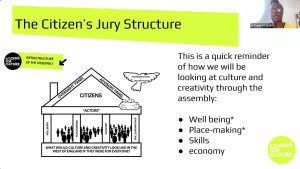
On the 27th and 28th September the West of England Citizens’ Assembly met for the second time, with sessions held online across the four Unitary Authorities.
On Saturday 27 September, citizens from Bristol and South Gloucestershire came together to deliberate, and on Sunday 28 September, citizens from Bath and North East Somerset and North Somerset met in their own online session.
The Citizens’ Assembly for the West of England is designed so that some meetings take place in person and some online.
In-person sessions give citizens the chance to connect as a whole group, while online meetings reduce travel and make it easier to take part regularly, as well as allowing more focused discussions on local issues.
The Cultural Plan and Assembly question
The central task for the Assembly is to create a Cultural Plan by answering the question:
What would culture and creativity look like in the West of England if they were for everyone?
The idea is that there are two layers to this plan. When the Assembly meets as a whole group, citizens consider the regional picture to shape a regional plan. When they meet in smaller area-based groups, like this weekend, they dig deeper into the issues and concerns which affect local areas.
This weekend focussed particularly on the themes of Wellbeing and Placemaking with presentations and discussions which explored these ideas in multiple ways.
Saturday and Sunday
Citizens began both days by introducing themselves in breakout groups and sharing what culture means to them personally, grounding the discussion in their own experiences. Assembly members have been going on cultural visits and having creative adventures across the region, as part of their Assembly experience.
Both days included a range of presentations and ideas. After each presentation, citizens worked in facilitated breakout groups to reflect, share observations, and prioritise questions for speakers. Groups were also encouraged to link their questions to both local and regional contexts, ensuring evidence could inform the Cultural Plans at both levels.
Citizens used simple tools, such as a “red card” to flag jargon or unclear points, to help keep discussions accessible to all. At the end of each round, groups fed one key observation back into the main room, so that a wide range of perspectives was captured.
Speakers for the weekend
- Dana Lungu (University of Bristol), on work with migrant and refugee mothers, and the role of community spaces in providing welcome and cultural connection.
- David Moss (NHS) shared his journey from senior system leader to creative health advocate, highlighting the power of cultural storytelling in health and care.
- Stella Mann (Glenside Hospital Museum) on connecting past mental health practices with contemporary neuroscience to reduce stigma and support wellbeing.
- Esther Lam (Bristol Refugee Festival) on migrant-led cultural projects exploring identity, memory and belonging, and the value of inclusive community spaces.
- Lizzy Stephens & Louise Betts (Travelling Light Theatre) on theatre made with and for children and young people, and the importance of including children’s voices in cultural planning.
- Dr Natalie Hyacinth (University of Bristol) on the role of sound and music in building solidarity, belonging, and cultural wellbeing for marginalised communities.
- Adam Fuller (The Front Room) on transforming a disused building in Weston-super-Mare into a thriving community-led cultural hub.
- Laura Porter (Now Hear This Music C.I.C.) on disabled-led, co-produced music-making as a way to support wellbeing, connection and inclusion.
- Angie Bual (Trigger) on bold, inclusive public art events co-created with communities to celebrate diversity and strengthen cohesion.
Recordings of all the presentations and Q&As in the citizens’ assembly are made available so that citizens can revisit them as they reflect on the growing body of evidence.
Citizens themselves are also beginning to propose evidence and themes they would like to see presented to the Assembly.
In future sessions, alongside live presentations, citizens will also receive Snapshots. These are short summaries of research and sector-wide evidence prepared by a range of experts from the region and beyond. Snapshots cover topics ranging from creative education and inclusion, to everyday creativity and volunteering, to the state of museums and heritage. The intention is to give citizens access to as broad an evidence base as possible.
The next Assembly meetings will take place on Saturday 11 and Sunday 12 October when the themes will be Skills and Economy.
We will share the next update on Monday 13 October.
–
Sunday 14th September update:
Sunday 14th September marked the first day of the West of England Citizens’ Assembly which will take place over eight days in September, October and November.
52 citizens from all walks of life came together from across Bath and North East Somerset, Bristol, North Somerset and South Gloucestershire.
They came together to answer the question “What would culture and creativity look like in the West of England if they were for everyone?”
They were supported by a team of independent facilitators (pictured above) and LaToyah McAllister-Jones and Rebekah McCabe as Co-Lead Facilitators.
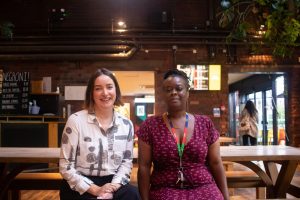
(Rebekah and LaToyah)
The Mayor of the West of England welcomed citizens and thanked them for taking part in the assembly. In the morning, there were lots of introductions and the group of 52 agreed how they wanted to work together during the assembly.
There was a practical workshop with Play:Disrupt to help citizens explore different aspects of the creative and cultural ecosystem in the region.
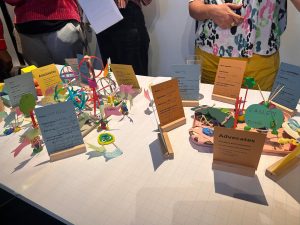
(Play:Disrupt workshop)
After lunch, there were three presentations:
- Sarah James, Head of Creative and Cultural Industries for the Mayoral Combined Authority, talking about the cultural ecology in the West of England.
- Sophie Moysey, Senior Relationship Manager at Arts Council England about the funding landscape shaped by the government’s lead arts funder.
- Kathryn Davis, Director Visit West, talking about the visitor economy in the West of England.
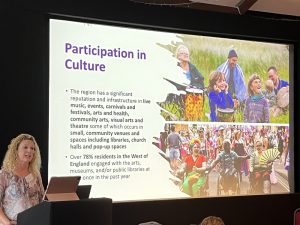
(Sarah James, Mayoral Combined Authority)
After each commentator spoke, citizens worked together, in eight groups each with an independent facilitator, to reflect on what they heard. They then asked questions to the commentators to clarify and follow-up on key points that interested them.
The next assembly days will be on the 27th and 28th September when citizens will meet online in their four area groups – Bath and North East Somerset, Bristol, North Somerset and South Gloucestershire.
Citizens will experience a wide range of case studies, stories and evidence, selected by the independent Advisory Panel.
We will share the next report from the Citizens’ Assembly at 8am on Monday 29th September. There will also be a short documentary made about the Citizens’ Assembly created by journalist and filmmaker Neil Maggs.


